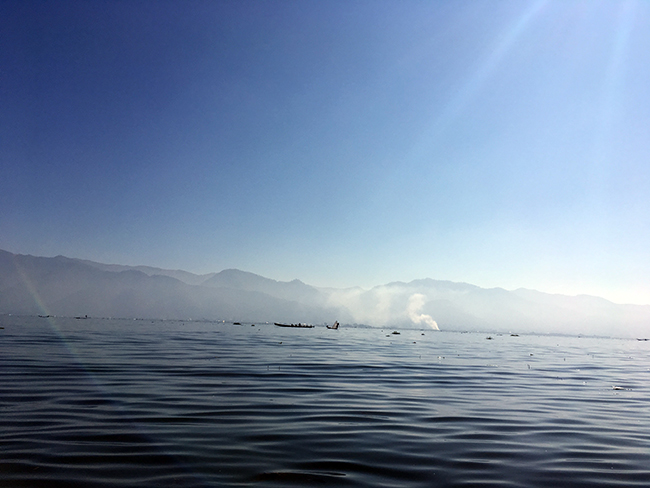People hitchhike for many reasons: meeting locals, lack of public transport, saving money… In Myanmar, I hitchhike also because the long-distance buses are killing me.
They are slow, they move a lot (I get really dizzy) and it’s freezing inside because of the AC. Having survived many 40-hour train rides and 24-hour bus rides before throughout India and Southeast Asia, I have come to suffer Burmese buses so much I dread them.
From Hsipaw to Naunghkio
So for the first part of the journey I did not hitchhike, sorry. A lot of travellers talked about the Gokteik viaduct that the Mandalay-Lashio train crosses through, so I set out to see it for myself.
The train ride was bumpy and slow, and full of other travelers. About three hours after leaving Hsipaw we finally caught sight of the valley that the bridge crosses. Cars and trucks go down and up the sides of the valley, but the railtracks float above it on one of the highest bridges in the region (and the world?).
After the Gokteik, I left at the first station that the train stopped: Naunghkio!
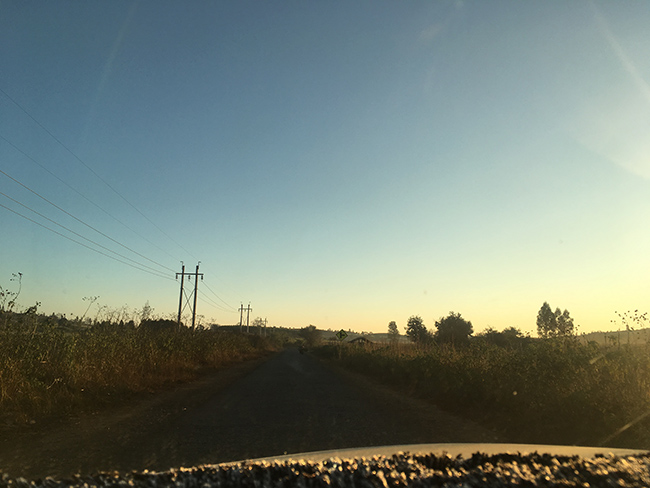
Hitching a ride with a general in Naunghkio
After a big meal at Lucky restaurant, I made the mistake of telling them I was going to Inle, so everyone came forward to help me get a bus.
The son of the manager took me on his bike and dropped me at one of the two travel agencies in town. There, they shamelessly tried to rip me off by offering me a morning bus ticket for 16,000 MMK.
They said there were no buses left for the day. So as soon as the son of Lucky’s manager left, I walked an hour until I reached the southern tip of the town.
There, I removed my sunglasses and cap and raised my thumb, smiling. A lot of drivers would wave back and say “thank you!”, rather confused about what it was that I was trying to do out there, waving at all the cars passing by.
I implemented a combination of raising my thumb and waving vertically, and the number of vehicles who stopped doubled, although no one was going far enough.
In a matter of minutes, people from nearby houses and businesses crowded around me, and told me many different stories about buses that ran to Inle.
At first it’s all fun and smiles, but soon enough I realized that by being surrounded by people, the chances that a car would stop were next to zero. So sometimes I would have to smile as I swiftly moved away from them, walked fifty meters and tried again.
It was about two hours later that an army guy showed up on his motorbike. In English, he told me somebody called his phone and told him about me. I am the sheriff! he said.
He told me about a bus that was leaving “really soon” towards Taunggyi. It had been so long trying to hitch a ride that I accepted his promised bus ride. And then he took me back to the same travel agency from before…
Now that I was with the sheriff, there was suddenly a bus at 7pm, a few hours away, ha!
I told them I would return to get on that bus, and walked south again. I was so tired that I gave up reaching the end of town, and stopped halfway, in a place still surrounded by many businesses.
I raised my thumb and smiled through all the weird stares, and finally this one guy in his sports car stopped.
“Where you go?” “Inle” “Hm…” “Lawsawk…” “Hmmmm” “Intaw?” “Oh, Intaw, yes, let’s go!”
Mr. Shu was doing a delivery to a town near Intaw. He was an army man. Military guys in checkpoints nodded at our car, so I thought he was some kind of big shot. He told me about his life in the army, and after intense questioning he ended up giving up some information about military personnel that I “cannot tell anybody, eh!”
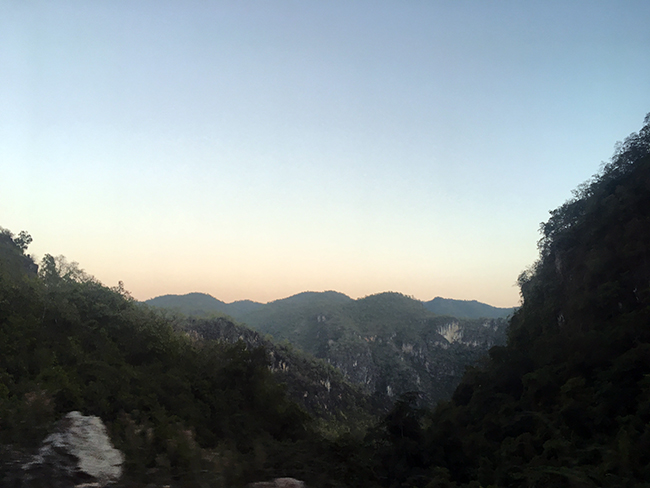
Magic people in Intaw
The road between Naunghkio and Intaw is quite beautiful, specially near the crossing of the Myitnge River. There, the road goes down and up a valley, green mountains stand tall on both sides with their proud cliffs. A lot of human work was probably put into that part of the road.
South from there, the road soon encounters a bunch of small lakes and follows along the shores for a few kilometers until one finds Kyakku, one of the handful of villages on road 41.
Past Kyakku, Intaw appeared before us 20 minutes later. The Sun had long set by then, and the town was submerged in complete darkness except for a couple of tea stands.
I knew there was no accommodation of any sort in town (original plan: make it to Lawksawk at least, not getting stuck in Intaw), but I still asked Mr. Shu if he knew any. “No, I will ask.”
After talking to a few locals, he gave up and told me “no place to sleep”. “What about the temple? Can you ask if there is any temple or monastery here?”
Religious temples are always a plan-B shelter for wanderers. He asked a man on the street, and the man jumped inside the car with his son, to my surprise.
They took us to a side road where the only Christian church in town was. There, Mr. Shu knocked on the home next to the church, and a kind lady opened the door. After some talking in Burmese, the lady told me to come inside, they would host me for the night.
At first, I perceived some obvious reluctance on that lady’s side to take me in, but it was either that or sleeping outside under the cloudy-rainy sky. I chose shelter. I tried my best to show infinite gratitude, and once inside tried to be as invisible as possible in a little corner in the living room.
The mother started talking to me and I did not understand a word. She smiled, made a quick journey to the kitchen, and returned with tiny oranges (a kind I had never seen before, where you don’t peel them but eat the whole thing, and it’s crunchy on the outside).
I made gestures to let her know that I did not wish her to prepare any food nor cause any trouble. But then her two youngest sons (the eldest one was at uni) came downstairs, guitar in hand. The youngest kid sat by his mom, the other one joined me on the straw mat.
Not only did they gave me shelter and food, but also one of the warmest and most beautiful nights of my entire trip.
As soon as the middle son hit some chords, the mother started singing with an amazing voice. The youngest son was smiling at his brother, then his mom then at me, and repeat. After the first song, the mother instructed him to join her for the following songs.
And there it was! Mother and son, a wonderful combination of voices to the tune of the middle brother’s acoustic guitar. And me, caught in all of it, wondering how it all happened, how some people are really magic and that wooden house was the warmest house in the Universe that night.
I was so sorry I could not chime in their Sunday School songs, which they sang in Burmese. When the middle brother threw his guitar at me, all I could offer in return was some gentle Bob Marley.
Later the younger brother produced a table and more food. He spoke a bit of English, and I believe I managed to transmit my feelings to the family through him.
Shortly after, the dad-husband arrived, and after being briefed about my situation, he gave me a tour of the church, which was next to the house. He was in charge of it.
He asked me tons of questions about religion and Christmas celebrations in Barcelona. Back at the house, it was my turn to ask him about betel nut, which is something everyone seems to chew around Myanmar, including that woman and his husband.
They taught me how to prepare it, had a good laugh at me trying it, and after a while it was decided that it was good night for everyone in the house.
From Intaw to Lawksawk
This part of the route was rather uneventful, except for the crowd in Intaw who “helped” me find a bus to Lawksawk.
How was I supposed to explain that I wanted to hitchhike? The lady from the house gave me breakfast, and the man handed me money for the bus fare. Since I showed up guest-riding a car instead of a bus, they concluded I had no economic means to go on.
I quickly rejected the offering and boarded the bus.
My plan was to get off at the next stop, far away from the wonderful people of Intaw whose town didn’t even have an article on Wikipedia and who would not “allow” me to hitchhike my way out of the region like an unattended hobo.
Except I met this man from Lawksawk who would talk marvels about Inle Lake, more and more intense in his speech as my curiosity fed him endless questions. I took the chance to question him about politics, militias and the Rohingya crisis (cough, armed repression).
So I completely forgot to get off at the next stop and the next thing I know I was in Lawksawk.
(The minivan-bus from Intaw to Lawksawk costs 2,000 MMK, or 1.3 EUR. If you choose to take the minivan until Shenyaung, it will cost you 4,500 MMK. Lots of buses run from Shenyaung to Inle Lake.)
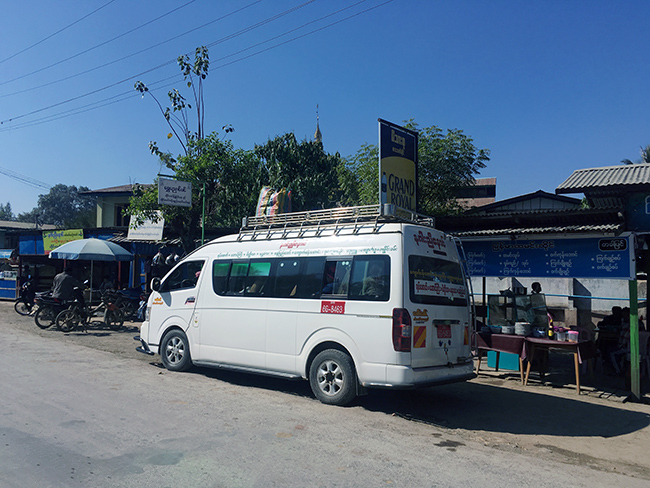
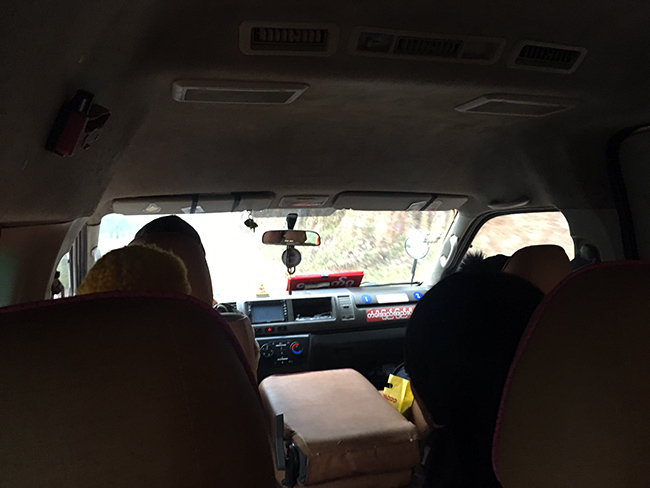
From Lawksawk to Inle by truck
I resumed my hitchhiking in the town of Lawksawk, which is called Yatsawk in Burmese.
There, I walked south along Route 43 until I decided I was on the outskirts. I had barely showed my right thumb to the coming cars when a semitruck stopped.
Two young fellows were driving all the way to the lake! They had some car tire business they were not very excited to discuss.
They made me promise “good stories from other places” in exchange for a free ride, so I told them about running out of paper in the toilets of the Forbidden City, escaping from thieves inside the trunk of a car in South India, meeting with a king in Senegal, and whatever fun anecdotes I could recall at the moment.
I was happy that my stories sparked their curiosity and they kept me up with endless questions about the countries out there.
We passed Shwenyaung and quickly reached Nyaungshwe, the gate to the lake.
Despite arriving in a local truck (instead of a tourist bus), we were stopped at the police control before entering Nyaungshwe. My backpack gave away my status as a tourist, and I paid the 5-day entrance fee (13500 MMK).
Then, finally, the one and only Inle Lake! Still and somewhat misty, it lay there to be looked at like a sleeping monster who rewarded those of us who ventured into it with out-of-this-world scenery.
